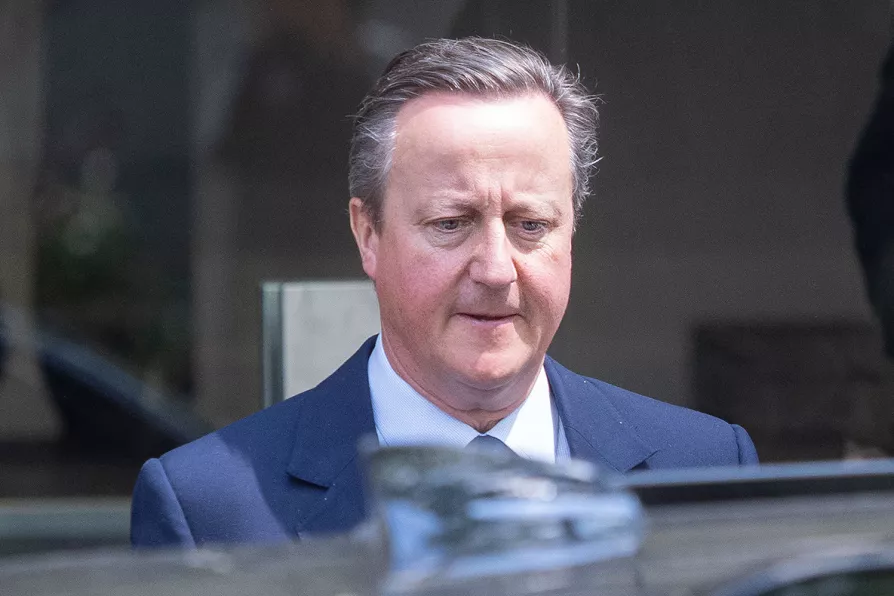
 Former prime minister David Cameron leaving after giving evidence to the Covid-19 Inquiry at Dorland House in London, during its first investigation examining if the pandemic was properly planned for and "whether the UK was adequately ready for that eventuality," June 19, 2023
Former prime minister David Cameron leaving after giving evidence to the Covid-19 Inquiry at Dorland House in London, during its first investigation examining if the pandemic was properly planned for and "whether the UK was adequately ready for that eventuality," June 19, 2023
FURY at Tories caught joking about breaking the rules during the 2020 Covid lockdown is entirely justified.
Like the Downing Street revels that prompted Boris Johnson’s disgrace, they expose an elite to whom the sacrifices imposed on the rest of the country were just a game.
Both point to the need for a reckoning with the whole Conservative Party, however much Rishi Sunak, number two in the Johnson Cabinet, tries to distance himself from it (he was apparently too busy to attend the partygate vote today, but managed to schedule a call with Ukraine’s President Volodymyr Zelensky, a sign he has learnt at least some propaganda tricks from his ex-boss).
As a distraction exercise the Zelensky call was transparent. But it’s just as vital we see through the one mounted by former prime minister David Cameron at the Covid Inquiry.
The insistence that the government was simply caught out having “prepared for the wrong pandemic” — that forward planning was focused on a new flu variant, and the nature of the virus that hit the world in 2020 was essentially unforeseeable — is an old one. Cameron’s health secretary Jeremy Hunt, now Chancellor, was hawking it back in 2021.
But given the Cameron administration’s failure to act on the findings of its own Exercise Cygnus pandemic rehearsal — allowing stocks of usable PPE to deteriorate despite the exercise predicting these would soon be exhausted, for example — the claim is untenable.
Nurses forced to wear bin bags for lack of protective gear paid a heavy price for Cameron and Hunt’s irresponsibility, as well as for the chaos and inefficiency introduced by privatisation of NHS Supply Chain — a process that dates back to 2006.
Cameron’s main argument — that the spending cuts he imposed from 2010 made Britain more financially resilient and thus better able to cope with crisis — is more dishonest still.
BMA council chairman Professor Philip Banfield is blunt: there is “no doubt that both staff and patients were put in harm’s way” by Cameron’s cuts. Serious underfunding led to severe understaffing that persists to this day. NHS workers were reporting a “permanent winter crisis” in the service even before Covid.
Cameron’s logic must be exploded — because not just the Tories, but today’s Labour Party sign up to it. When Keir Starmer and Rachel Reeves talk about “financial stability” as a reason not to raise spending, they are repeating the austerity mantra. Clearing up the Tories’ mess is, apparently, to be done by repeating their policy.
But cuts did not make Britain more resilient. They undermined the NHS and other services. They left us vulnerable and unless the health service receives restorative investment and pay rises to bring staffing numbers back up, we will remain so.
The wider impact of Cameron’s war on the public sector and “bonfire of regulations” barely featured today, but is relevant too.
The massacre of public-sector jobs accompanied an explosion in the precarious gig economy, which expanded by 25 per cent between 2010 and 2018. The throttling of local government through deep budget cuts encouraged outsourcing services to the cheapest, least conscientious for-profit providers.
Here are the origins of the scandals around infected workers continuing to work for lack of sick pay, of the casualised care home staff who unwittingly spread the virus as their agencies sent them from job to job.
Cameron has a lot to answer for. But more important still is that the lessons are learned.
Britain was not prepared for an emergency in 2020. It was not prepared because it had starved essential services of investment and allowed private companies, with a profit incentive to cut corners, to infest the NHS and dominate social care.
And we will not be prepared next time, since Labour and the Tories agree both on spending “restraint” and on private-sector provision. Unless we can change that, the whole Covid Inquiry is a waste of time.













